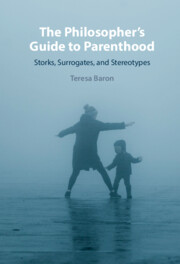Book contents
- The Philosopher’s Guide to Parenthood
- The Philosopher’s Guide to Parenthood
- Copyright page
- Dedication
- Contents
- Acknowledgements
- Introduction
- Chapter 1 Babies, Blueprints, and Blood Ties
- Chapter 2 Social Roles, Stereotypes, and Being ‘Seen’ as a Parent
- Chapter 3 ‘Do You Have a Licence for That?’ Legal Parenthood and Transfers of Children
- Chapter 4 Duties, Dilemmas, and (Re)distribution
- Chapter 5 Paradigms and Parental Projects
- Conclusion
- Bibliography
- Index
Chapter 1 - Babies, Blueprints, and Blood Ties
What Makes a Biological Parent?
Published online by Cambridge University Press: 15 January 2023
- The Philosopher’s Guide to Parenthood
- The Philosopher’s Guide to Parenthood
- Copyright page
- Dedication
- Contents
- Acknowledgements
- Introduction
- Chapter 1 Babies, Blueprints, and Blood Ties
- Chapter 2 Social Roles, Stereotypes, and Being ‘Seen’ as a Parent
- Chapter 3 ‘Do You Have a Licence for That?’ Legal Parenthood and Transfers of Children
- Chapter 4 Duties, Dilemmas, and (Re)distribution
- Chapter 5 Paradigms and Parental Projects
- Conclusion
- Bibliography
- Index
Summary
The first half of this chapter investigates the ways in which the concept of biological parenthood is used in philosophy of parenthood but also in non-academic contexts, noting that ‘genetic parent’ is often – but not always – used interchangeably with ‘biological parent’. I raise the question of whether gestation constitutes biological parenthood in the absence of genetic connection, and I consider two possible explanations for discrepancy in the use of the concept of biological parenthood. I highlight ways in which the interplay between this and other concepts of parenthood means that discrepancy in our use of language has significant consequences and give an argument against geneticist understandings of biological parenthood. The second part of the chapter considers the right to be a biological parent and the right to not be a biological parent. The discussion of these rights-claims is illustrated by reference to current legal and philosophical dilemmas: debates over access to reproductive technologies; the dilemma faced by separated couples who disagree over the use of their frozen embryos; and the philosophical questions raised by the possibility of ectogenesis with regards to abortion. Is the right to end a pregnancy the same as the right not to be a parent?
Keywords
- Type
- Chapter
- Information
- The Philosopher's Guide to ParenthoodStorks, Surrogates, and Stereotypes, pp. 15 - 49Publisher: Cambridge University PressPrint publication year: 2023



